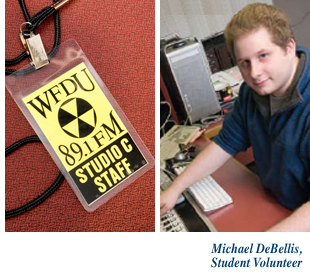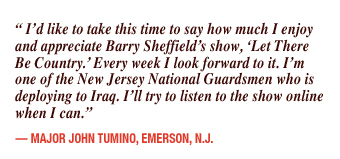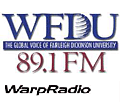

LEARNING FROM THE PROS
A handful of students who show exceptional promise have the opportunity to work at WFDU, where they can learn first-hand how a professional station is run.
“WFDU has the right kind of management,” says Nick Doshi, BS’90 (T), WFDU alumus and director of engineering for WDCW-TV in Washington, D.C. “The station isn’t run as a private club of college students, it’s run as a professional station. Because of this, students gain skills that will serve them very well later on in life.” Students not only learn about broadcasting, but practice audio editing, recording, sound engineering and wiring. They have access to state-of-the-art technology and software and have the unique opportunity to assist in airing live performances.

“We’ve always put an emphasis on helping students prepare for their career paths,” says Sheffield. “We make it our responsibility to give them all of the tools and skills they need to go on and have successful professional lives.” When it comes to providing guidance, Sheffield, who helped establish WFDU in 1971 as an FDU student, and Kraus, who has been the station’s general manager since 1980, are two of the station’s greatest professional resources.
After graduating in 1974, Sheffield entered New York’s radio scene and worked his way up the professional ranks at stations throughout the metropolitan area, including WXLO-99X, WOR-AM, The RKO Radio Networks, WNBC-AM and the CBS Radio Network. He returned to his alma mater in 1990 and has been working full-time for the station for more than 15 years. He also takes time to teach radio and television broadcasting, public speaking and drama.
Kraus began his broadcast career in 1974 and has held operational, engineering, news and management positions at several New York stations, including WPAT and WNEW. He is a member of The Radio Club of America and Sigma Delta Chi (The Society of Professional Journalists). Sheffield and Kraus each have nearly 35 years of professional broadcasting and programming experience that students can — and do — draw from on a day-to-day basis.

WFDU student workers often handle significant assignments at the station. Last summer, seniors Michael DeBellis and Michael Skeffington were given the task of completing a project that student host Dan Mueller, BA’07 (T), had started — Studio C/The Atomic Underground. The goal was to convert a former nuclear physics laboratory on campus into a studio and live-performance venue.
When Mueller graduated and moved on to work at CNN, DeBellis and Skeffington were given full reign over the project. “We thought about the types of bands that would be likely to come in and what we would need to support those bands,” recalls DeBellis. He and Skeffington were responsible for setting up the audio, microphones and sound levels while Sheffield set up the video equipment. “We worked as a team to get everything ready for when the live performances started,” says DeBellis.
Outfitted with state-of-the-art audio and video equipment, Studio C/The Atomic Underground serves the University as a location for live musical and radio-drama performances as well as for recording.
“We consider ourselves patrons of live music — the magic of radio melded with the magic of music,” says Kraus. The studio opened in October 2007 and has already distributed videos of events worldwide through public venues such as YouTube and direct Internet streaming. The entire $35,000 facility was built with funds donated by listeners.

Doshi is another WFDU veteran who gained important skills working at the station. “I knew a certain amount of engineering before I got to WFDU, but it was Carl that made sure I got the radio-frequency engineering skills I needed for my career,” he says. “He got me started on this path.” Since graduating, Doshi has handled a number of extensive engineering projects, such as rebuilding transmitter sites at the Empire State Building and constructing a $4-million studio facility for 106.7 Lite FM. “Every project I’ve been involved in during my career has been a result of my experience at WFDU. You keep growing as you go through your career, but you never forget what you learned first and where you learned it.”
As WFDU’s hosts have found with programming, many of the learning experiences at WFDU allow students more creativity and flexibility than commercial stations. “Looking back, I really appreciate the time I had at WFDU. I got to do things in that environment that I couldn’t in the professional world — there are too many other constraints,” says Doshi.
TJ Taormina, AA’93 (T), assistant producer for Elvis Duran and the Morning Zoo at Z100 in New York City, echoes Doshi’s gratitude. “Working so closely with Barry and Carl was my favorite aspect of being at WFDU,” he says. “Those two guys prepared me perfectly for the real world of radio. They truly understand the business on a professional level and made it a point to make sure I understood it too.” Taormina’s fellow Morning Zoo member, Greg Tyndorf, BS’96 (T), agrees. “It’s so great having experienced professionals like Barry there. You can go in and ask, ‘What’s going on in radio right now? What should I expect?’ and he’ll have answers for you.”

WFDU alumni make up an extensive network of professional connections that students can use as a resource. DeBellis, an electrical engineering technology graduate and former assistant programs/ operations manager at WFDU, interned in CNN’s engineering department on Columbus Circle in New York City, a position he acquired partially through WFDU alumus Rob Fox, BS’84 (T), director of media operations at CNN. “I learned the video end of things and how CNN operates behind the scenes,” DeBellis explains. “The whole building uses high definition and optical wires, so it was a great opportunity for me to learn how to use and fix the latest equipment.”
The Metropolitan Campus has a second station, WFDQ 91.9 FM, which is available entirely for student use and broadcasts to the campus community 24 hours a day. While the station has a more casual environment than WFDU, students benefit from an overlap in station management. Barry Sheffield, who started his radio career on WFDQ, is the station’s adviser, and its executive board is made up of students who have positions at WFDU. “We kept the station running,” says DeBellis, who was WFDQ’s general manager during his senior year. “The executive board makes sure deejays come in, teaches them about radio and makes sure they’re all set up to broadcast. It was a good way to practice what I learned at WFDU in a different environment.”
Often, students at WFDQ move up to WFDU after developing their skills. “I worked on the student station for two years and knew I wanted a career in radio, so I got a position at WFDU,” recalls Tyndorf. “I knew I needed more professional experience to get into the radio business. By the time I graduated, I was ready. I went from working part-time to full-time at Z100 the day after graduation.”
FDU Magazine Home | Table of Contents | FDU Home | MyFDU.net | Blog About It
©Copyright 2008 Fairleigh Dickinson University. All rights reserved.
For a print copy of FDU Magazine, featuring this and other stories, contact Rebecca Maxon, editor,
201-692-7024 or maxon@fdu.edu.
